The Southern Caliphate? ISIS in Somalia, South Africa, and Mauritius’ Fragile Periphery

On a humid morning in Bosaso, qat traders load bales onto battered trucks while quietly paying their “taxes” to armed men. The sums are small, the ritual routine. Yet those dollars, multiplied across ports and markets, form the bloodstream of ISIS in Africa’s southern flank. While Western eyes remain glued to the Middle East, ISIS has quietly expanded southward, embedding itself in Somalia’s fractured state, edging into South Africa’s informal economies, and probing the Indian Ocean’s offshore finance hubs. For Mauritius long marketed as an oasis of stability and finance the encroachment raises uncomfortable questions about complacency and resilience.
Somalia: The Stubborn Heartland
Somalia remains ISIS’ most durable African outpost outside the Sahel. Al-Shabaab still dominates insurgent activity, but ISIS factions have carved out enclaves in Puntland and the northern coast. Their appeal is less about ideology than survival: pay, weapons, and smuggling routes in exchange for allegiance. A 2023 UN Security Council report estimated ISIS’ Somali wing controlled taxation rackets worth up to US$20 million annually, largely from extorting port operators, qat traders, and smugglers.
These networks are lubricated by hawala, the informal trust-based financial system connecting diaspora hubs in London, Dubai, and Nairobi to Bosaso’s weapons markets. In one intercepted case from 2022, funds moved through a Kenyan broker in Nairobi before financing arms deals in Puntland. As one Somali analyst in Mogadishu put it, “This is not terrorism in isolation. It is business with guns attached.”
South Africa: The Financial Rear Base
In South Africa, ISIS operates more like a banker than a warlord. Since 2022, the U.S. Treasury has sanctioned several South African nationals for laundering ISIS funds, most infamously the Bassier family in Durban. Investigators allege hundreds of thousands of dollars were moved through charities and front businesses into Mozambique’s Cabo Delgado insurgency.
Johannesburg and Durban’s cash-heavy economies provide fertile ground. Informal trucking companies, corner shops, and small logistics firms become conduits. A 2023 Treasury note concluded bluntly: “South Africa has become a critical node for ISIS financing in Africa.” Local security researchers contrast this with Kenya, where tighter banking oversight has made direct laundering harder. Recruitment follows money. Encrypted WhatsApp groups target disillusioned township youth, promising status and a wage. Some are smuggled north to fight in Mozambique; others stay behind as couriers and fixers. South Africa’s value lies not in territory seized, but in its status as a G20 financial hub with just enough opacity to shelter illicit flows.

Mauritius: The Offshore Risk
Mauritius is no battlefield, but its risks lie offshore. The island’s US$12 billion financial sector, long marketed as “Africa’s Singapore,” has faced scrutiny since the FATF grey-listed it in 2020. Although later removed, questions linger over shell companies and weak due diligence.
Terror financiers do not need bulk transfers; they thrive on streams of modest sums. Analysts warn that small-scale laundering through Mauritian trusts could one day bankroll militant logistics. In 2024, FATF noted East African groups probing “alternative offshore jurisdictions.” No case has yet been traced to Port Louis, but local financial experts whisper concern. “We may be compliant on paper, but are we resilient in practice?” asked one Mauritian compliance officer, reflecting a worry often drowned out by the island’s self-image as a safe haven. For an economy that lives by financial credibility, even suspicion could spook Asian investors and trigger sanctions.
Regional Stakes: From Cabo Delgado to ASEAN
ISIS’ southern creep maps onto broader vulnerabilities in the Global South. Mozambique’s Cabo Delgado insurgency already derailed multibillion-dollar LNG projects led by TotalEnergies, chilling investment. If South Africa consolidates as a financial rear base and Mauritius becomes a laundering node, the consequences extend beyond Africa. Indian Ocean shipping, commodity finance, and Asian infrastructure bets could all feel the tremors.
The ASEAN link is underexplored but vital. Asian banks and energy firms dominate the financing of East African projects. If Mauritius’ offshore sector is even suspected of hosting terrorist-linked funds, the spillover into Singaporean, Japanese, or Malaysian financial circuits could be swift. Terrorism ceases to be a parochial African problem; it becomes a systemic threat to South-South capital flows.
The Blind Spot of Stability
The Indian Ocean’s narrative of stability is seductive: Mauritius as a financial oasis, South Africa as a BRICS anchor, Somalia as a distant anomaly. But ISIS is not bound by those categories. It exploits precisely the connective tissue of globalisation: hawala, remittances, shell companies, trucking routes.
For Mauritius, the threat is not fighters storming its shores, but offshore structures weaponised against it. For South Africa, the danger is less a battlefield than the corrosion of its financial system from within. And for Somalia, the fight is already here a laboratory where insurgency mutates into governance.
The lesson is stark: stability, like finance, is only as strong as the weakest compliance form. The Global South cannot afford to see terrorist finance as a Western obsession. It is a Southern problem, with Southern consequences, demanding a Southern voice. The question that lingers is simple but sharp: will these states recognise the cracks before they widen into fractures?
Sources
UNSC reporting on ISIS in Somalia; U.S. Treasury sanctions notices; FATF statements; regional security analyses; interviews and field reporting.

Add comment
Comments